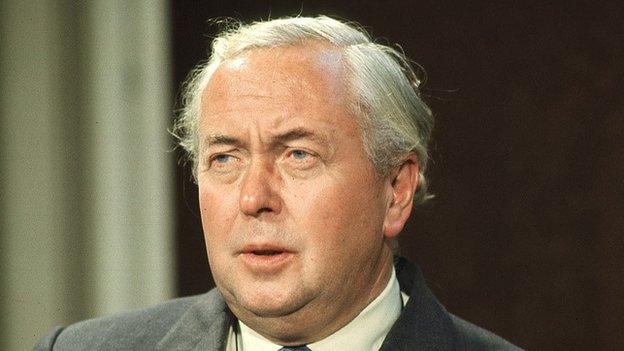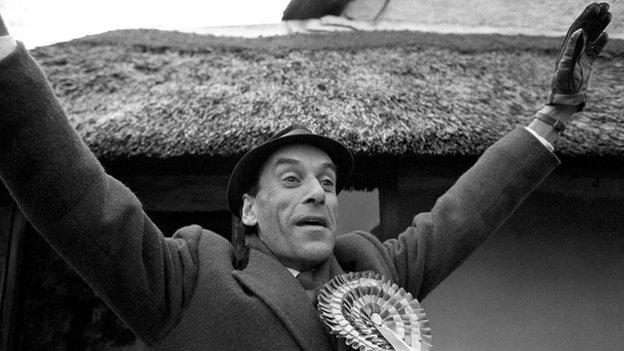Harold Wilson's foreign spy fears laid bare in secret documents
- Published

Harold Wilson feared being the target of smear campaigns by foreign spies, newly released documents reveal.
The Labour PM was convinced South African agents were plotting to discredit British politicians who had spoken out against apartheid.
His fears were sparked by media claims that Liberal leader Jeremy Thorpe had for years been paying "hush money" to a former lover, male model Norman Scott.
Mr Wilson believed Scott was being used by the South African security services.
The atmosphere of paranoia that surrounded Mr Wilson in the final days of his premiership in 1976 is laid bare in newly declassified documents released by the National Archive.
'Skeletons in cupboards'
He told the Commons that there had been "strong South African participation" in the disclosures about Mr Thorpe and on 1 February, 1976, he told Cabinet Secretary Sir John Hunt of his fears that he could be the next target of South African smears.
"If this means that one is therefore vulnerable, in a sense that no other politician is vulnerable to smear campaigns, plants and bribing of witnesses, whether truthful or not - then this involves far more serious consideration than any ordinary breach of privilege," wrote Mr Wilson.
"The employment of such methods could be directed to destroying particular political leaders and, for a time at least, their parties.

Jeremy Thorpe's reputation never recovered from his trial
"Were they to be directed uniquely against, let us say, the Conservative Party on the one hand, or the Labour and Liberal parties on the other, we could have general elections powerfully influenced and the choice of government dictated from outside this country.
"This is totally unacceptable, whether it is done by Soviet operators, South Africans or anyone else."
The papers reveal how Mr Wilson launched his own investigation into the Thorpe case, asking ministerial colleague Barbara Castle - and her young special adviser Jack Straw - to retrieve Scott's social security records, according to an October 1977 note by James Callaghan's principal private secretary Ken Stowe.
"This kind of thing was pursued avidly by Sir Harold Wilson [as he became after he left office in 1976] who was convinced Scott was being used by the South African State Security Organisation to destroy political leaders in this country. All that ran into the sand," the note, entitled "skeletons in cupboards," adds.
Media firestorm
The attitude of Mr Wilson's successor as prime minister, James Callaghan, towards his suspicions are revealed in a pencilled note in the margin: "PM said nothing to do with him up to those concerned".
Gordon Winter, the journalist who broke the story about the possible involvement of the South Africans in the Thorpe scandal, was known to have connections to the South African Intelligence Service (SAIS), sometimes known as BOSS.
But the files show that the British security services could find no evidence that Pretoria was behind the disclosures.
Mr Wilson quit as prime minister in March 1976 - just two years after being returned to power.
Mr Thorpe, who died last December, was forced to quit as Liberal leader in the media firestorm surrounding the allegations against him.
He was later cleared by an Old Bailey jury of conspiracy to murder after a bungled attempt to kill Mr Scott ended with the supposed hit man shooting dead his Great Dane, Rinka.